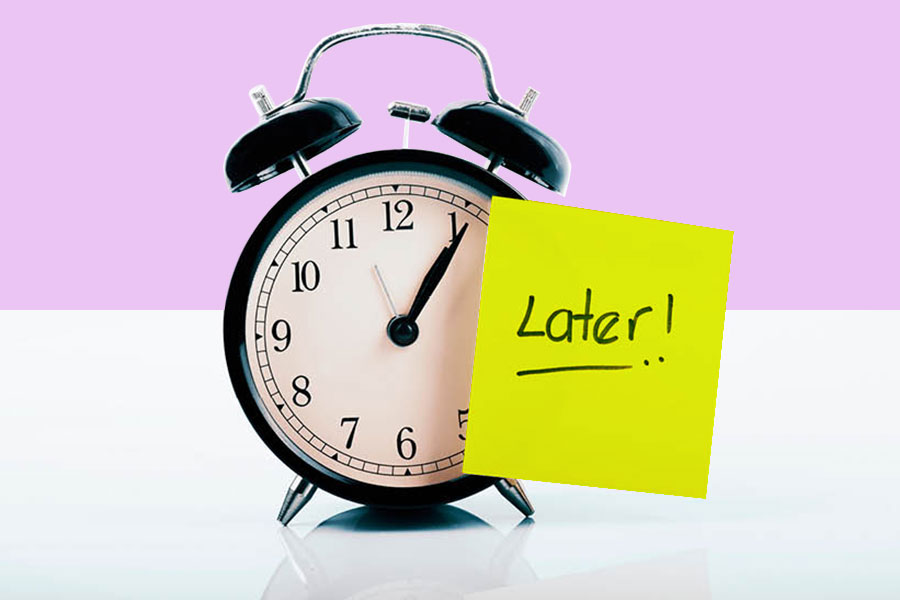Proven ways to stop procrastinating

We’ve all been there: current you decides to leave the mounting deadlines to future you – who’s going to be well up for it, right? – but then a week later you become that future you. Panic ignites your gut and you realise with sweat-inducing clarity that you’re no more in the mood for putting together a 50-slide presentation than you were the week previous. Only caffeine can get you through this self-sabotage now.
You procrastinated, in other words. To behavioural economists, that means you signed a mental contract which valued immediate pleasure (doing sweet FA) over long term success (doing work). Other academics would say you’re just not very good at managing your priorities. Both camps would, in their own ways, be correct.
But to a growing number of psychologists – experts who study the health implications of procrastination – your mental gymnastics might be down to some much deeper emotional triggers. What’s more, their research shows that task-avoidance could be both symptomatic of and responsible for a whole host of maladies – from chronic stress and its secondary ailments (tension headaches, IBS, insomnia) to potentially fatal inflammatory diseases.
We won’t skirt the point: chronic procrastination could take years off your life and negatively affect its quality on a daily basis. Which is why, after almost succumbing to another Netflix binge, we instead got round to putting together this guide to overcoming it for good. Best not put off reading it. Unless you’ve got something more pressing to do.
So what is procrastination?
It could be any mix of a myriad of emotional and behavioural issues getting in the way of you getting sh*t done. But a distinction needs to be made clear from the outset and crystally so: to put off work from time to time is perfectly normal. It’s when you procrastinate a lot, or indeed all the time, as the case may be, that you fall into the category of a chronic procrastinator.
“A lot of people think that procrastination is just delaying things. But a colleague of mine explains it best – all procrastination is delay but not all delay is procrastination,” says Dr Fuschia Sirois, a researcher at the University of Sheffield who specialises in the psychology of health, with a particular focus on the role procrastination plays on wellbeing.
“There’s strategic, sagacious task-delay – re-prioritising for efficiency or reacting to a change in workflow – and that’s not procrastination,” says Dr Sirois. “True procrastination is deciding to avoid a task that’s necessary, something that you really intended to do – like writing a paper or finishing the gardening. It’s also a task that’s important to you, not something trivial. The last part of the definition, as we see it, is you procrastinate despite knowing you’ll be worse off, despite knowing there’ll be negative consequences for you or others.”
What causes procrastination?
This is where things get complicated. The number of potential triggers could be even longer than your to-do list. But Dr Sirois’ work shows that procrastinators often avoid tasks due to negative emotions tied-up in the processes. Fear of failure, for example. Or fear of judgement. You might think you’re distracted because finishing your presentation is tedious, where in fact you’re subconsciously scared of your boss’ beady eye.
“We’re wired to avoid pain and seek out pleasure,” says Dr Sirois. “When you procrastinate and do something that makes you feel momentarily good, you get a reward. The problem is you never get to the source of the negative emotions that cause you to avoid the task in the first place.” That’s why we distract ourselves with TV and daydreaming and social media and WhatsApp group chats.
And phones certainly don’t help matters. Psychologists refer to the little dopamine hits you get from distractions like technology as ‘social temptations’. These are like mini sirens luring you off course toward ostensible pleasures while sinking your productivity. Instagram scrolling is a vibrant neurochemical win when a stultifying task has been taking the colour out of your day. Your brain has no chance.
What happens then is a mental trade off. “Procrastinators have difficulty thinking of their future selves,” says Dr Sirois. That’s when current you leaves those deadlines to future you, who becomes your beast of burden. “It’s an idealistic view of the future self,” says Dr Sirois. “You think: I’m having a hard time but the me of next week is going to be brilliant, will have all the ideas and willpower.”
This underpins the procrastinator’s mindset. “The more psychologically different we feel from our temporal selves – whether it’s a past self we keep remembering or a future self we’re imagining – the more we see ourselves as not alike, and the more they feel less real,” says Dr Sirois. “It’s easier to do that to a stranger.”
How do I overcome it?
It starts with realigning with your temporal self. Procrastination sets in motion a vicious circle of stress and task-avoidance. The more you avoid the more stressed you become. The more stressed you are the more you avoid. “People who are future oriented tend to associate with positive feelings – the broad and abstract. You’re not in that state when you’re stressed,” says Dr Sirois. “It shifts the focus from future to immediate, which in turn begets more procrastination. If you think of your future self more, you’ll improve.”
The next step is to re-programme the mental equations you make when sitting down to the task at hand. Contrary to pop psychology, setting up a reward for completing the task is actually counterproductive. “Imagining a positive outcome or reward can actually be less motivating,” says Dr Sirois. “Your brain can convince itself it’s done, which makes it harder to getting around to starting. You can end up daydreaming about success instead of achieving it.”
Instead, you should really dig down into the job in front of you. “Find something positive in the task and focus on it,” says Dr Sirois. “Yes, it’s challenging. No, it’s not necessarily enjoyable. But I’m going to learn something and grow as a person. Or I’m going to make someone else happy. Don’t think about the outcome, which could be linked to a fear of failure. Think about breaking down the steps of the task and what you’ll learn from each.”
For a mental boost, you can reward yourself, but not in the way you might think. “We’ve seen that engaging in an enjoyable activity before you take on your task can increase willpower,” says Dr Sirois. “But it shouldn’t be a hedonic activity. Instead do something eudaimonic, something with meaning that’s emotionally rewarding.” This can be anything from exercise to a creative pursuit. A brief swim, for example, not only offers an endorphin rush from exertion, but also a sense of achievement, which builds up your stores of willpower.
So swimming a few hundred metres might help you go the distance at your desk. But ultimately it comes down to no longer kidding yourself that there’s a superhuman version of you who’ll swoop in next week to save you from your present workload. Start reconnecting with the tasks at hand and exercising willpower like a muscle. And if you make only one change today, put ‘Place my phone in the other room’ at the top of your to-do list. Because without removing today’s social temptations you might never reconnect with tomorrow’s self.












